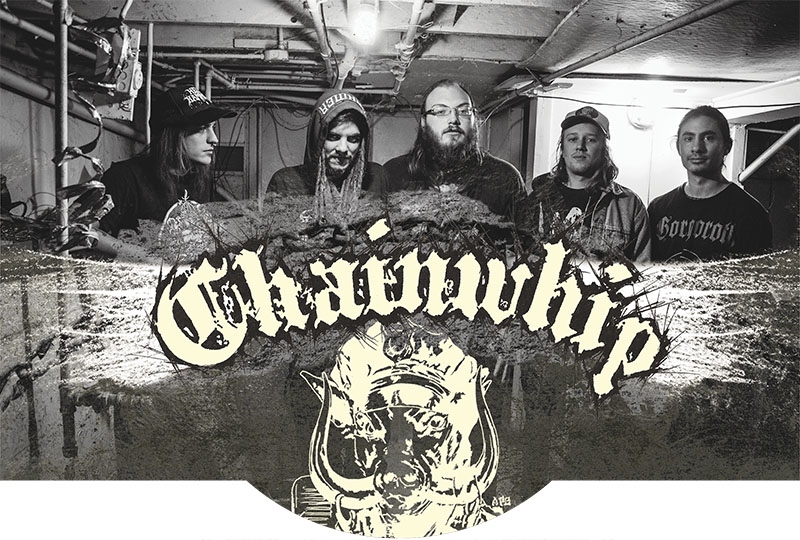Localized – February 2013
Localized
February’s Localized highlights two of Salt Lake’s most punishing punk bands—Chainwhip and Filth Lords. While the bands vary stylistically—with Filth Lords incorporating pop- and street-punk elements, and Chainwhip crushing skulls with hints of black and death metal brushed over the top of D-beat crust—this show promises to be an all-around ornery affair, with Year of the Wolf kicking things off at The Urban Lounge, 241 S. 500 E., on Friday, Feb. 8. As always, $5 gets you in, 21+.
Chainwhip
If I was asked to find a single word to describe musical extremists Chainwhip, it would be—after careful consideration—unrelenting. Although the band has gone through several different names and lineup changes over its four-year existence, their desire to completely annihilate listeners via their music has not wavered. After Chainwhip played a handful of shows under one of their original monikers, Assüm, they were finally fully realized by the addition of vocalist Luke Walker, otherwise known as “Critter”—who brought an interesting combination of good old hardcore “positive mental attitude” and nihilism to the band—and bassist Brock “Hellfinger” Grossl. “I had only been in the band for 48 hours when I played my first show with them,” says Critter. The entire band was—ahem—“wasted,” but they managed to plug through three songs in five minutes, as if attempting to clear an entire rainforest with a dull machete, which was less than a quarter of the time they spent dealing with technical difficulties—a seemingly perfect introduction to the band, indeed.
“There is a really unique duality to the lyrics I write,” says Critter. “One song will deal with how much I think the world is a disgusting place and how I wish it would change for the better, but then I’ll follow it up with a sort of sardonic, ‘fuck you all’ type of theme.” While this may initially seem a bit strange to the casual listener of so-called “extreme music,” it meshes well with the vibe of the band and the musical influences they draw from. “I start out writing riffs influenced by various types of metal—black, doom, death, thrash,” says guitarist and main songwriter Trevor Call, “but I’m also heavily influenced by crust-punk and D-beat, so those influences come through in what I write, as well.” The band steadfastly refuses to be pigeonholed into a single genre, which works to their advantage. Musically, they can share the stage with metal bands, punk bands and even hardcore bands (to an extent), and be well-received. “We’re not even really trying to mix genres,” says Critter, “but that’s just how it works, and I’m glad we’re able to do it without sounding too gimmicky.”
Chainwhip is not far from a communistic regime, so to speak, in that each member has an equal voice when it comes to songwriting. “If someone comes up with a riff that sounds good to us, we can always tweak it and form an entire song around it,” says Call. Drummer Corbin Baldwin says, “Sometimes it only takes us 30 seconds to write an entire song.” At the same time, there are a few songs that have been kicked around for almost a year, but have yet to be finished. The chaotic nature of songwriting seems to work well with the chaotic nature of the band, which features two guitarists, the other being Chris Garrett. With one demo to their name, available for streaming on SoundCloud (soundcloud.com/chainwhip), Chainwhip are currently working on writing and recording a proper full-length, which has caused the frequency of live performances to drop to once or twice a month, and, true to form, practice schedules have dwindled to one night a week. Most bands might see this as a negative thing, but Chainwhip make the most of the time they do have to write and rehearse, and it is well represented in their live performances and the sheer brutality of the music they deliver. Hell, it is my understanding that Critter destroyed a Book of Mormon during the band’s previous appearance at Localized, opening for Handicapitalist and Stark Raving Mad last April. Let us not forget that larger, more publicized and far weaker bands have been temporarily banned from the state of Utah for essentially the same thing. While not dwelling on this act, it does serve to demonstrate Chainwhip’s anti-religious stance, and it certainly fits not only with the band’s live performance, but with the sheer brutality of their music. Granted, they aren’t inventing a new genre or a new lifestyle, but they don’t claim to be attempting to re-invent the wheel: They simply punish peoples’ ears the way Norwegians burn churches.
2013 promises to be a good year for Chainwhip. With a solid lineup, solid songs and a solidly jumbled approach, the blackened sky is the limit for them, and they seem poised to make the most of it. In person, the band members are all relatively soft-spoken—bordering on shy, truth be told—but it’s that unassuming presence that makes Chainwhip all the more deadly when unleashed. After all, it’s always the quiet ones.
